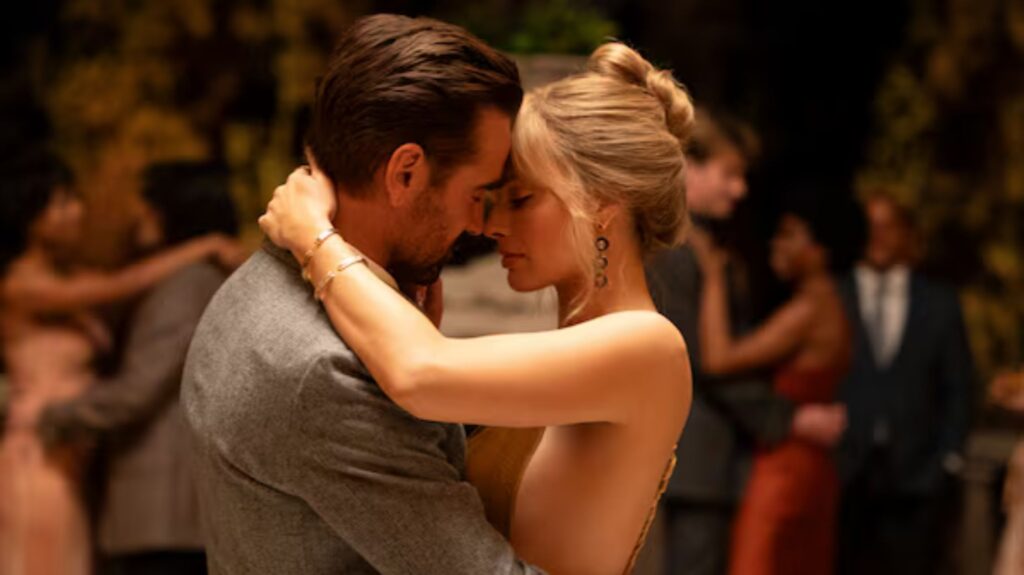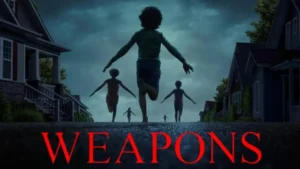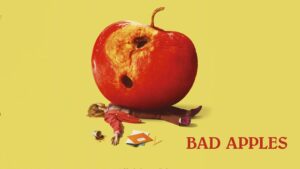Basic Info & Context
Title: A Big Bold Beautiful Journey.
Genre: Romantic Fantasy / Drama.
Director: Kogonada.
Writer: Seth Reiss.
Music / Score: Joe Hisaishi.
Release Date: Theatrical release in the U.S. on September 19, 2025.
Runtime: ~1 hour 49 minutes (~109 minutes).
Cast & “Means Character(s)”
Cast
Here are the major cast members and some supporting names:
- Margot Robbie as Sarah.
- Colin Farrell as David.
- Kevin Kline.
- Phoebe Waller-Bridge.
- Lily Rabe.
- Jodie Turner-Smith.
- Billy Magnussen.
- Sarah Gadon.
- Hamish Linklater.
- Brandon Perea.
- Lucy Thomas, Yuvi Hecht, Calahan Skogman, Chloe East, Jacqueline Novak, Jennifer Grant.
So the ensemble is fairly large, though narrative focus remains largely on the leads and a few supporting characters.
The “Means Character” of A Big Bold Beautiful Journey Movie.
In movies, the “means character” is the one whose choices, experience, inner life, and growth carry the emotional and narrative weight. In A Big Bold Beautiful Journey, there are two central viewpoint characters:
- David (Colin Farrell) — he is the male lead, with a past he regrets, responsibilities (his ailing father), a sense of dreams unfulfilled, and longing. Much of the movie follows his journey: how his life has turned out, how his past decisions shaped him, how longing for something more drives him.
- Sarah (Margot Robbie) — the female lead. She has her own emotional baggage, reluctance toward commitment or relationship because of past hurts, memories of her mother, etc. She also participates in the magical/fantasy-type journey.
If forced to pick one as the primary “means character,” I’d say David edges Sarah slightly in being the character through which more of the film’s “what ifs” are felt, though Sarah is nearly co-leading. Their arcs are interdependent.
Box Office & Commercial Performance
How did A Big Bold Beautiful Journey do commercially? The data suggests it underperformed relative to expectations.
- Worldwide gross (as of early October 2025): about US$ 20 million.
- Domestic (U.S. & Canada): around US$ 7 million.
- Other territories: approx US$ 13 million.
- Opening weekend in U.S.: projected $8-10 million but actual was lower; the film earned about US$ 3.5 million in its opening weekend.
- Domestic total as per Box Office Mojo: ~$6.67 million.
- International and “other” markets added but didn’t dramatically raise the total to blockbuster heights.
From the box office figures, the film seems to have had a modest budget (though precise production cost is not widely reported in sources I saw), and the revenue is underwhelming especially given the star power (Robbie, Farrell) and the fantasy premise. Critics and industry watchers have described it as a “flop” in terms of box office.

Niche, Style, & Thematic Domain
What kind of movie is this, and what themes does it try to explore?
Genre / Niche
- Romantic Fantasy / Magical Realism: The film introduces supernatural or fantastical elements — doorways, portals, reliving past moments, time-like distortions — alongside real emotional and relational drama.
- Drama / Relationship exploration: It is a love story, but one that resists simplistic romantic tropes; it focuses a lot on regrets, past hurts, “roads not taken,” midlife reflections.
- Fantasy-tinged introspection: The fantastical element (magical GPS, doors to past moments) serves as a mechanism for reflection, emotional confrontation, and possible redemption. It enters metaphorical territory.
So its niche is among films that mix romance + fantasy + self-examination — similar in tone to films like Eternal Sunshine of the Spotless Mind, The Time Traveler’s Wife, or other romantic fantasies that use magical realism to probe regret, memory, love.
Themes & Mood
Some of the core thematic threads and emotional undertones:
- The power (and weight) of past decisions: what if you could revisit moments where you think you went wrong? Could you choose differently, or at least understand them differently?
- Longing, regret, suppressed dreams: David’s yearning, Sarah’s reluctance to embrace relationships, the things they sacrificed or left behind.
- Connection, vulnerability, risk: Overcoming fear of vulnerability; connecting with someone despite past hurts.
- Magical realism as a metaphor: The portals, the GPS, the way the journey takes them — these are not just plot devices but emotional landscapes.
- Love, but not simplistic or perfect love: the film seems more interested in love’s messiness, the awkwardness, the loss, rather than ideal.
Mood: wistful, wistful with melancholy; visually beautiful, romantic; emotionally teetering between heartwarming and heart-tugging, but admitting flaws. It leans more toward introspective than high-energy romance.
Deep Plot & Narrative Analysis
Here’s a more detailed look at how the plot unfolds (without giving every twist, but enough to see structure), plus analysis of what works, what doesn’t.
Plot Outline (moderate spoilers)
- Setup / Inciting Moments
David (Colin Farrell) is attending a mutual friend’s wedding. He’s single, emotionally reserved, carrying regrets: familial responsibilities (caring for his father), dreams unfulfilled, questions about identity, feeling he never became what he hoped. Sarah (Margot Robbie) also is at the wedding; she’s reluctant about romance and commitment — perhaps due to past hurts. Their first meeting is transient but with a spark. The inciting “fantastical” twist comes when David’s car is impounded (or “car is towed” / “towed away” / not usable) so he goes to a quirky car rental / agency; he gets a 1994 Saturn SL (old car) with a special GPS. The GPS begins to guide him in ways that feel supernatural: to doors/portals, stops that are not ordinary, etc. - Rising / Journey Begins
Sarah also ends up involved via a car from the same company; their paths cross again. The GPS and strange portals lead David (and Sarah) to revisit moments from their past: places that held emotional weight (a favorite museum, memories with parents, perhaps places tied to loss). These stops reveal their backstories: Sarah’s mother’s death, relationship estrangement with her father; David’s immigrant past (he emigrated from Ireland as a teenager), dreams he abandoned. Intimacy builds: they share stories, regrets, vulnerabilities. But there are tensions. Sarah is (initially) less willing to commit, more guarded. David’s longing and hope for love (or fatherhood, or meaningful connection) push him. - Conflict & Emotional Climax
As they go through magical doors, they confront past mistakes (David with his ex-fiancé, Sarah with past relationship(s) / family betrayal). There are surreal landscapes; they imagine what could have been — for example, attending the wedding together, or changing decisions. These are emotionally heavy, occasionally romantic and tender. There is a point where the fantastical nature causes crisis: Sarah proposes ending the journey (to avoid further pain), or the car breaks, or the portals close. There is a moment of heartbreak, or fear that perhaps this is fantasy, or a dream, rather than reality. - Resolution / Ending
Eventually they accept that even if not all changes are possible, understanding the past is meaningful; they must return to the real world, make decisions going forward. There is some reconciliation: David acknowledges what he wants, Sarah acknowledges her fears. The journey ends with hope: perhaps not a perfect romantic resolution, but one of growth, acceptance, possibility. The ending is bittersweet — they have risked emotional exposure, maybe broken old patterns, but with knowledge that love involves risk, and that some doors can be opened again.
What Works
Pacing & Over-talkiness: Some critics say the A Big Bold Beautiful Journey film is “slow” and “overly talky” — wants to dwell on reflections and dialogue more than dramatic tension.
High Concept but Thin Plot Push: The idea of portals and reliving past moments is interesting, but some feel the emotional stakes don’t always land; some scenes feel repetitive, or that Sarah’s arc is less compelling than David’s.
Box Office vs. Expectations: Given the star cast and fantasy romance feel, expectations were higher; when those aren’t met, perception shifts. Some audience reviews mention the film is too sentimental or doesn’t deliver fully on its big idea.
Tone Inconsistency: Balancing magical/fantastical with real emotional pain is hard; some parts feel like they drift into “Instagram quote of the day” sentimentality rather than grounded drama.
“Means Character” Revisited & Emotional Core.
As noted, David is a primary lens: his childhood dreams (reminded by his immigrant past, his father, expectations), his regrets (decisions not taken), his fears (that he is “ordinary” or that he will lose possibility). Sarah is more guarded but essential: she represents fear of vulnerability, of being hurt, perhaps abandonment (family loss, etc.).
Their journey together is the emotional core. The film derives its power from their contrasting but intersecting wounds: David’s longing, Sarah’s caution. The “means character” is not a solo thing here — the A Big Bold Beautiful Journey film treats them as co-leads. The growth arc is mutual: David learning to forgive himself / accept vulnerability; Sarah learning to trust / open up.
Commercial & Critical Reception Summary.
Putting the numbers and reviews together:
- Critics’ response has been mixed to negative: things like Rotten Tomatoes scores are low, Metacritic reflects criticism about over-sentimentality, slow pacing.
- Audience reactions are also mixed: some viewers find it emotionally satisfying, sweet, and gentle; others feel it doesn’t deliver on its promise, or that the romantic chemistry isn’t strong enough.
- Box office underperformance: opening came in far below projections; movie didn’t get the momentum many expected.
Final Thoughts of A Big Bold Beautiful Journey Movie & Why It Matters (or Doesn’t). Journey
A Big Bold Beautiful Journey is ambitious. It tries to combine romance, fantasy, reflection, and heavy emotional themes. It wants to make us think about what we’ve lost, what we regret, what we might still have the chance to change. It leans into whimsy (portals, magical GPS, nostalgic doors) and attempts genuine emotional connection.
For viewers who like romance with a little fantasy twist, who enjoy thinking about life’s “what ifs,” and who don’t mind slower pacing, this film has things to love: Robbie & Farrell’s performances, some beautiful visuals/moments, and the emotional ache of regret and hope.
But for many others, the structure feels derivative; the emotional parts sometimes feel like they come from a comfort zone rather than surprising us; the box office suggests it didn’t connect broadly. The high concept is interesting, but perhaps not executed in a way that gives full payoff.





